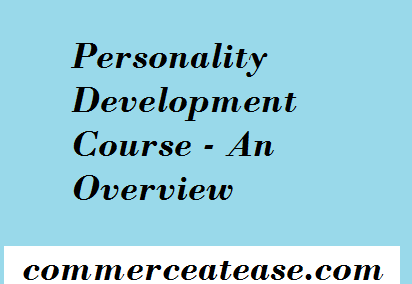
Personality Development Course
What is there in Personality Development Course?
What is taught in personality development courses?
Every job requires some basic personality traits. Some people already have such traits in them but the others have to learn these. Personality Development Courses make this learning possible.
Personality development courses typically aim to enhance and refine various aspects of an individual's personality, including their communication skills, self-confidence, interpersonal relationships, and overall self-improvement. The specific content of these courses may vary depending on the provider and the targeted audience, but here are some common topics covered in personality development courses:
Common topics covered in Personality Development Courses:
Developing an understanding of one's strengths, weaknesses, values, beliefs, and goals. This includes self-reflection exercises, personality assessments, and identifying areas for personal growth.
• Communication skills:
Enhancing verbal and non-verbal communication abilities, active listening, assertiveness, public speaking, and presentation skills. Courses may cover effective speaking, body language, negotiation skills, and conflict resolution techniques.
• Emotional intelligence:
Developing emotional awareness, empathy, and the ability to manage emotions. This includes understanding and regulating one's own emotions, as well as recognizing and responding to the emotions of others.
• Confidence building:
Techniques to boost self-confidence, overcome shyness, and develop a positive self-image. This may involve strategies to overcome fear of failure, building resilience, and setting realistic goals.
• Interpersonal skills:
Developing effective relationships and fostering teamwork. This includes building rapport, networking, developing empathy, resolving conflicts, and understanding cultural differences.
• Time management and goal setting:
Strategies for prioritizing tasks, setting achievable goals, and managing time effectively. This may include techniques for planning, organizing, and maintaining work-life balance.
• Positive attitude and motivation:
Cultivating a positive mindset, adopting an optimistic outlook, and maintaining motivation in various aspects of life. Courses may cover techniques for overcoming obstacles, managing stress, and developing a growth mindset.
• Personal grooming and etiquette:
Enhancing personal appearance, grooming, and manners. This may include guidance on professional dress, dining etiquette, and social etiquette.
• Leadership skills:
Developing leadership qualities, including decision-making, problem-solving, delegation, and team management. Courses may cover leadership theories, effective communication for leaders, and ethical decision-making.
• Personal branding:
Creating a personal brand identity, managing online presence, and building a professional reputation. This may involve guidance on networking, personal marketing, and utilizing social media platforms.
It's important to note that the specific content and emphasis of personality development courses can vary significantly. Students should focus on various aspects mentioned above, in their routine to make it an easy process.
Whatever may be the case, a student must learn the 21st Century Skills in order to fit into modern business world.
